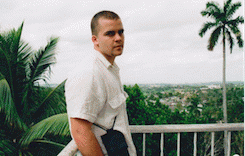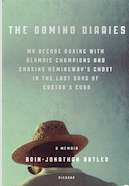
Brin-Jonathan Butler at Hemingway's home, San Francisco de Paula, 2000
(Image by Troy Turi) Details DMCA
My guest today is Brin-Jonathan Butler, writer, filmmaker and author of The Domino Diaries: My Decade Boxing with Olympic Champions and Chasing Hemingway's Ghost in the Last Days of Castro's Cuba.
JB: Welcome to OpEdNews, Brin! Why did you write this book?
BJB: Thank you for having me. I wrote The Domino Diaries after having spent 11 years traveling to the island of Cuba and, I suppose, trying to make sense of some of that journey. When Columbus arrived in the late 15th century, he had no idea where he was and one of his first questions of the native Taino population he encountered was ascertaining if Cuba was indeed an island. He was assured that it was, but was also informed that the island was also infinite. I'm not sure how much has changed for many visitors 500 years later. Cuba, like most wonderful books, never finishes what it has to say. And whenever I'm asked what are the places to go in Havana or across the island, what I love about the place is that the Cuban people themselves are the sites to see. And the more you bring to them, the more fulfillment you can have with so much of what that incredible culture has to offer.
JB: It's well-known that the Cuban people are poor. But they're also notable for their hospitality, even to strangers. Coupled with the almost universal poverty, it's a big surprise for American visitors. Did you experience this yourself in your forays there?
BJB: This is a wonderful topic to explore. White collar jobs such as doctors and lawyers----as well as elite athletes----are financially compensated at around $20-$25 a month. The first world always gasps at this and it's not unjustified. But let's examine some definitions of poverty in society. Homelessness doesn't exist in Havana while you're under siege from it the moment I walk out my front door here in Manhattan. One in five children is born into poverty in the US despite the abundance of wealth in our country. Up until recently, tens of millions of Americans had no access to healthcare. Medical related bankruptcy was the number one reason Americans lost everything. Cubans have very little money, but nobody is going to foreclose their house or deny them medical coverage. All Cubans have ration books to, in theory, look after their basic needs. Over the decades since the triumph of the revolution, results have been very mixed on the efficacy of this. Education and healthcare are free to the masses, yet jobs and availability of medicine have proven a major challenge. Literacy and infant death mortality rates in Cuba surpass not just the third world but even the United States. Rent is free on the apartments Cubans live in, however most are very crowded. All cultural and sporting events are free and massively attended. Castro heavily subsidized the arts in Cuba so in every area but political commentary, the arts carry a weight and vibrancy with the masses across the country unlike any country I've ever visited. I've never come across more passionate audiences than I've seen in Havana for painting, ballet, classical music, poetry, sports----down the line. It's been made available and the objective behind all of them cannot be money given how the system works. When that happens, culture is something people control and organically discover rather than the market-researched, think-tank created society I think most Americans reside in. The American dream isn't dreamed any more, it's dreaming you. There's a constant struggle in Havana, with the hardships, to depend on your community and neighborhood to ease the conditions imposed. So while people suffer, you notice other things going on about how we struggle back home by essentially being so disconnected by virtue of money being the fundamental metric for success in our society.
The most immediate effect I saw of a culture not primarily based on what's bought and sold was the effect on women, they felt attractive and safe rather than preyed upon by magazines and news to feel perpetually in danger and ugly. This, in turn, affected men and the children in Havana dramatically. Relative poverty and a shared struggle brought a lot of people together in being compassionate for others since it was mostly felt as a shared burden. But that changed a lot even during the decade I traveled to Havana as income inequality reared its head with the tourist dollar. All of these dynamics carry easy to translate headlines back home to where we live, but Cubans live in the fine print and nuance underneath. And usually the headlines only betray our own myopic position rather than trying to illuminate much about the circumstances under which Cubans live. That being said, I never met any Cubans (or people from anywhere else) who would gleefully elect to live in poverty. However, Cubans poverty must be contextualized with what conditions existed pre-Fidel Castro and allowed him and the revolution to come to power. Conditions for the weakest and most vulnerable in Cuba were dire in terms of curable disease, illiteracy, infant death mortality, corruption, and 70% of businesses in Cuba were owned by US business interests along with GITMO being annexed in perpetuity without any Cuban being involved in that negotiation.
JB: You've put your finger on the complexity of Cuba and our relationship with and attitude toward the country and the government as well. Americans seem to want to pigeonhole and even demonize Cuba but, as you point out, the truth is much, much greyer. We don't seem to do well with that, do we? We'll come back to that later. Let's talk now about what attracted you to boxing in the first place. That seems to be the beginning of the whole story, no?
BJB: What attracted me to boxing was how Mike Tyson used it as a means to build himself up after years of serially being tormented by bullying. I was familiar with the finished product of Mike Tyson as one of the world's most intimidating presences at the height of his fame as a boxer, but I caught an intimate interview with him from prison where I learned a great deal about his backstory and history with bullying. A swarming incident when I was 11 left me a near shut-in and it was only after hearing how profoundly bullying had affected Tyson in that interview that I left my house and entered two places I'd never been before on my own: a boxing gym and a library.
The library was to read more about Tyson's life and also to explore the books he'd mentioned in the interview he'd been reading to educate himself: Hemingway, Dostoyevsky, Fitzgerald, Tolstoy, Voltaire. And then the boxing gym to learn how to stand up for myself and regain some measure of self respect. Both places deeply impacted me and I'm sure saved my life. And I think something that is true of most writers, we're usually obsessed with "losers" and underdogs because of how much more self-aware they are traditionally than winners. Cuba very quickly registered with me as one of the world's most fascinating underdogs in their struggle against the United States and the nature of their values in opposition to American values was so startling. I think I encountered that first with Cuban boxers at the Olympics thoroughly dominating Americans and then going further in demonstrating what they fought for in rejecting millions to abandon their country which the American media depicted as a hell-hole all Cubans sought to leave at the first chance.
Oversimplifying the complexities of Cuba only made it more enticing to me. Cuban athletes didn't look like stereotypically miserable, robotic Cold War Russians. They were unique and as enigmatic as they were inviting as symbols of a mysterious, dense culture. Attempts to dismiss Cuban culture and society only seemed to suggest what they stood for made American commentators anxious to grapple with it in any meaningful way. I'd seen something of the same thing with Americans dismissing universal health care in Canada, my native country, as though it were something to be dreaded. I married an American who came from an upper-middle class family, yet she lived everyday of her life in fear someone in her family would get sick. I never knew anyone in Canada afraid of getting sick, regardless of their economic standing. Yet my system was vilified and feared by friends of my wife. Americans love to talk about Cubans drinking the Kool-Aid with their system, but most Cubans I've met discuss much more critically their own society and values than Americans do of theirs, which suggests Americans might have better syrup in their own Kool-Aid.
JB: That could be because Cubans also have an amazingly high literacy rate, as you've pointed out. Tell us about the bind Cuban boxers have found themselves in since Castro.
BJB: I think the main bind is the one demonstrated in the popular Cuban joke inventorying the successes of the revolution: healthcare, sports, and education. But the crucial failures remain: breakfast, lunch, and dinner. Several of the elite Cuban athletes I interviewed who'd abandoned Cuba on smugglers' boats left families behind and explained that the safety net Cuba offered was far better than what America's alternative was if things turned out badly for them in professional boxing. They talked about the differences in attitude toward vulnerable people in both countries. The poor weren't thrown out of their houses in Havana if they couldn't pay rent. Education was free to anyone. Nobody was without medicine or going bankrupt if someone in their family got sick. But America offered market rates for their talents unlike their homeland if they succeeded on their promise.
(Note: You can view every article as one long page if you sign up as an Advocate Member, or higher).







